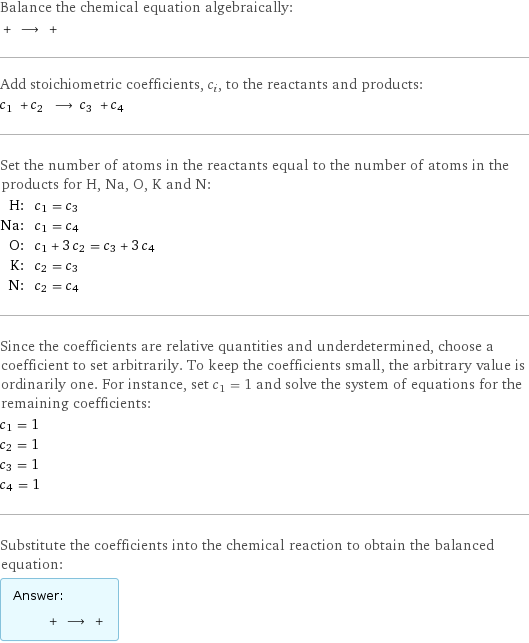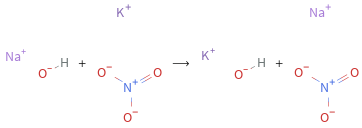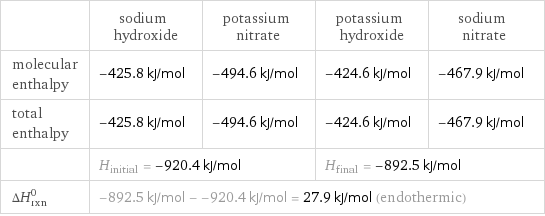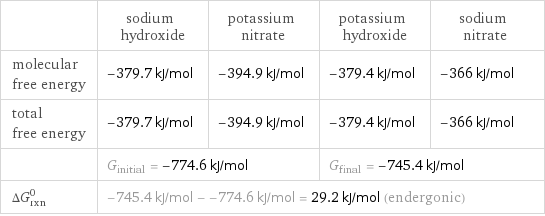Input interpretation

sodium hydroxide + potassium nitrate ⟶ potassium hydroxide + sodium nitrate
Balanced equation

Balance the chemical equation algebraically: + ⟶ + Add stoichiometric coefficients, c_i, to the reactants and products: c_1 + c_2 ⟶ c_3 + c_4 Set the number of atoms in the reactants equal to the number of atoms in the products for H, Na, O, K and N: H: | c_1 = c_3 Na: | c_1 = c_4 O: | c_1 + 3 c_2 = c_3 + 3 c_4 K: | c_2 = c_3 N: | c_2 = c_4 Since the coefficients are relative quantities and underdetermined, choose a coefficient to set arbitrarily. To keep the coefficients small, the arbitrary value is ordinarily one. For instance, set c_1 = 1 and solve the system of equations for the remaining coefficients: c_1 = 1 c_2 = 1 c_3 = 1 c_4 = 1 Substitute the coefficients into the chemical reaction to obtain the balanced equation: Answer: | | + ⟶ +
Structures

+ ⟶ +
Names

sodium hydroxide + potassium nitrate ⟶ potassium hydroxide + sodium nitrate
Reaction thermodynamics
Enthalpy

| sodium hydroxide | potassium nitrate | potassium hydroxide | sodium nitrate molecular enthalpy | -425.8 kJ/mol | -494.6 kJ/mol | -424.6 kJ/mol | -467.9 kJ/mol total enthalpy | -425.8 kJ/mol | -494.6 kJ/mol | -424.6 kJ/mol | -467.9 kJ/mol | H_initial = -920.4 kJ/mol | | H_final = -892.5 kJ/mol | ΔH_rxn^0 | -892.5 kJ/mol - -920.4 kJ/mol = 27.9 kJ/mol (endothermic) | | |
Gibbs free energy

| sodium hydroxide | potassium nitrate | potassium hydroxide | sodium nitrate molecular free energy | -379.7 kJ/mol | -394.9 kJ/mol | -379.4 kJ/mol | -366 kJ/mol total free energy | -379.7 kJ/mol | -394.9 kJ/mol | -379.4 kJ/mol | -366 kJ/mol | G_initial = -774.6 kJ/mol | | G_final = -745.4 kJ/mol | ΔG_rxn^0 | -745.4 kJ/mol - -774.6 kJ/mol = 29.2 kJ/mol (endergonic) | | |
Chemical names and formulas

| sodium hydroxide | potassium nitrate | potassium hydroxide | sodium nitrate Hill formula | HNaO | KNO_3 | HKO | NNaO_3 name | sodium hydroxide | potassium nitrate | potassium hydroxide | sodium nitrate